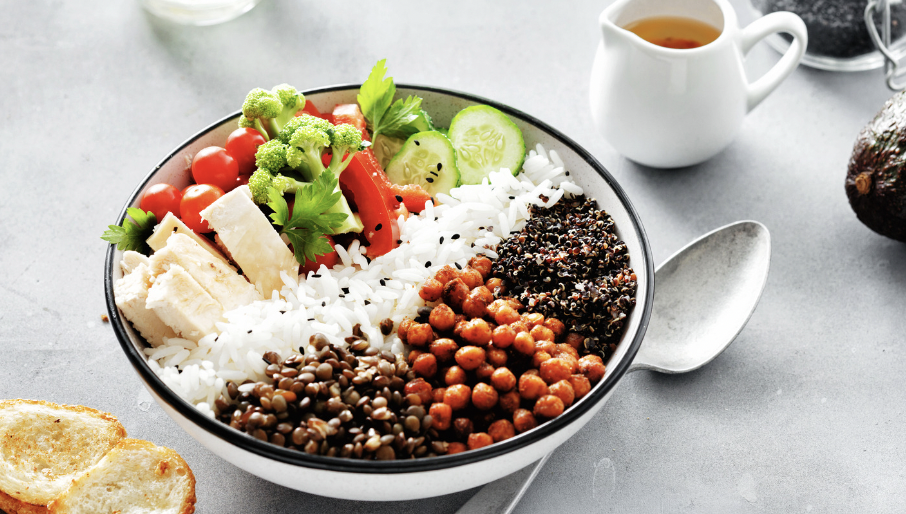
5 Ways to Manage Your PMS with Nutrition
PMS (premenstrual syndrome) is typically not an enjoyable time of the month when you may experience a broad amount of ...
PMS (premenstrual syndrome) is typically not an enjoyable time of the month when you may experience a broad amount of symptoms right before obtaining your period. Some symptoms that may seem familiar to you could be food cravings, bloating, mood swings, irritability, and many more! Many people think that these symptoms are inevitable and there isn’t much you can do, but think again!
An unhealthy diet is actually associated with the aggravation of PMS symptoms! That being said, maintaining physical activity and following a healthy diet can help calm your PMS symptoms exceptionally. Your diet and nutrition play a very large role in managing PMS!
Here are 5 ways that can help you experience a less symptomatic PMS with nutrition!
#1: Increase Calcium & Vitamin D Intake
In a recent research study, women increasing their calcium intake for 3 months, reduced PMS symptoms drastically regarding fatigue, irritability, and depression. To incorporate more calcium into your diet, try to add foods like cheese, yogurt, beans/lentils, almonds, chia seeds, leafy greens, edamame, or sardines! It is also important to remember that calcium is not just found in dairy products!
Vitamin D is highly associated with calcium since it is beneficial in helping your body absorb it. Women with high levels of Vitamin D intake were associated with a 41% decrease in PMS symptoms compared to those who had a Vitamin D deficiency, in a recent study. Foods such as fortified orange juice, salmon, tuna fish, fortified dairy and plant milks, and mushrooms contain high amounts of Vitamin D! Overall, an increase in the combination of calcium and vitamin D, has been shown to increase follicle maturation and menstruation, making it easier to manage your PMS.
#2: Eat Whole Grains
Refined, processed carbs such as white flour, white bread, and white rice, can be known to trigger inflammation and lack nutrition. These foods also can disrupt your blood sugar balance, causing a decrease in estrogen and serotonin, resulting in significant mood swings. Swapping processed grains for whole grains can help control inflammation, keep your blood sugar stable, and increase nutrients in your body! Try switching from white rice to brown rice, white bread to whole grain bread, or regular pasta to whole grain pasta and cereals!

#3: Reduce Salt
If you are experiencing painful bloating or tenderness in the breasts, then this tip will be most beneficial for you! A reduction of salt in your diet will help reduce the water retention and uncomfortable bloating that is associated with PMS.
Some ways to resolve this can be to focus on eating more at home as fast food or restaurant food typically contains high amounts of salt. Ensure that when purchasing vegetables from cans, there is no salt or sauce added, and look for “low sodium” on condiments, snacks, or meals. If you find yourself craving something salty, eating fruits that are sweet with savory vegetables such as roasted peppers, can satisfy the craving without extra salt added.
#4: Eat Iron Rich Foods
Another simple way in easing your PMS misery can be to include iron-rich foods on your plate. Iron deficiency anemia can be prevalent during menstruation due to significant loss of blood and iron. To prevent this, the iron lost from menstruation needs to be replaced by incorporating iron-rich foods back into your diet. Meats such as beef, pork, poultry, fish, or shellfish can help replenish the iron stores in your body. Other high-iron foods include beans, peas, raisins, apricots, iron-fortified cereals, and dark leafy green vegetables which are also great sources for those who are vegetarian!
#5: Manage Your Fluids
When you are experiencing uncomfortable PMS symptoms, the last thing you want is to have difficulty sleeping. Alcohol and caffeine play can disrupt your sleep and contribute to further PMS symptoms. Alcohol specifically, increases the production of estrogen and testosterone in the body which will exacerbate mood swings and irritability associated with PMS. Another way alcohol may negatively affect your PMS is by worsening cramps due to its impact on the balance of prostaglandins. By reducing your alcohol intake by even a small amount, you can manage your PMS more easily! To prevent the symptoms produced by caffeine, try to have your last cup of coffee about 6 hours before you head to bed!

Lastly, increasing how much water you drink during PMS can help decrease the duration of menstrual bleeding and will overall reduce the severity of the common unpleasant symptoms of PMS. To help consume more water, tie it into your routine. Drink one cup of water every time you go to the bathroom, every time you brush your teeth, or every time you shower!
Takeaway:
Overall, maintaining the proper nutrients, hydrating, and being aware of the foods you are consuming can help decrease the severity of your PMS symptoms drastically. It’s important to make sure you are actually fueling your body during these times in order to support your hormones and manage possible discomfort. Food and nutrition play an extremely large role in managing your menstrual cycle, and following these simple tips can increase your daily lifestyle during PMS immensely!
If you’re looking for a place to get started with your nutrition goals, ready to find balance with food, and looking to optimize your health, take our free “What’s Your Eating Personality Personality?”
One of the first steps towards healthy, balanced eating is to understand what to eat, feel confident in your food choices, and have total clarity in how to incorporate effortless nourishment into your everyday routine.
We’ve made it easy for you to get started!
In this FREE quiz that takes less than 1 minute to take, you’ll learn what Nourished Eating Personality you are, receive guidance on how to build balanced eating habits that are realistic so you can feel good, and how to start feeling in control of your food choices, at all times!
Written by Sammy Bran, nutrition intern. Fact checked by Allison Tallman RD.


